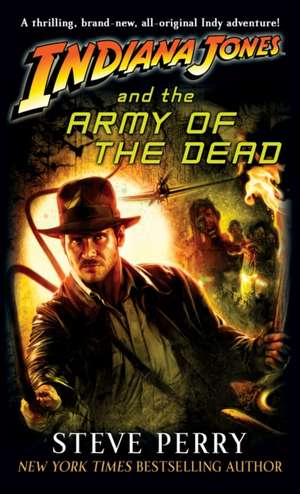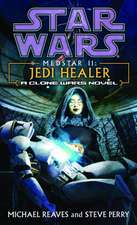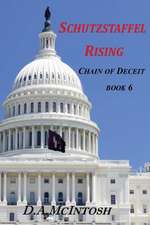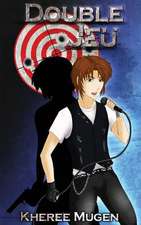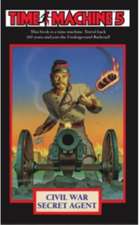Indiana Jones and the Army of the Dead: Indiana Jones
Autor Steve Perryen Limba Engleză Paperback – 31 aug 2009
On a treacherous odyssey across the Island of the Dead, where the legend of the zombi looms large, spiders, snakes, and booby traps will prove the least of Indy’s challenges. And capturing the prize will be child’s play compared to confronting an enemy unlike any other, whose numbers are legion and nearly impossible to kill–because they’re already dead. . . .
Preț: 45.13 lei
Nou
Puncte Express: 68
Preț estimativ în valută:
8.64€ • 8.98$ • 7.13£
8.64€ • 8.98$ • 7.13£
Carte disponibilă
Livrare economică 24 martie-07 aprilie
Preluare comenzi: 021 569.72.76
Specificații
ISBN-13: 9780345506986
ISBN-10: 0345506987
Pagini: 325
Dimensiuni: 109 x 173 x 23 mm
Greutate: 0.16 kg
Editura: Del Rey Books
Seria Indiana Jones
ISBN-10: 0345506987
Pagini: 325
Dimensiuni: 109 x 173 x 23 mm
Greutate: 0.16 kg
Editura: Del Rey Books
Seria Indiana Jones
Notă biografică
Steve Perry wrote for Batman: Ther Wars: Shadows of the Empire, and wrote the bestselling novelization of the blockb Animated Series during its first Emmy Award-winning season, authored the New York Times bestsellers Star Wars: Death Star (with Michael Reaves) and Stauster movie Men in Black. Perry has sold dozens of stories to magazines and anthologies, and has published a considerable number of novels, animated teleplays, nonfiction articles, reviews, and essays. He is currently the science fiction, fantasy, and horror book reviewer for The Oregonian.
Extras
Chapter One
In the Air over the Windward Passage,
Eight Miles West of Haiti
Summer 1943
Indy hated small airplanes.
Yes, yes, planes were necessary evils, he knew. If there was going to be a race to collect an ancient trea sure in the modern world of 1943, the winner wasn’t going to be the guy who sailed ’round the Horn on a clipper ship to find it. Flying was a sharp knife in any field archaeologist’s tool chest— but because planes were necessary didn’t mean he had to like the blasted things. Or trust them. Oh, sure, mostly they flew just fine. Sometimes they didn’t. After the third or fourth time one came down hard enough to blow out the tires or break the undercarriage, he was less trusting. Yeah, you did what you had to do to get where you needed to get. Someday your number was going to be up no matter what you did. No point in worrying about it too much, but . . . flying around like a bird?
Because of his OSS training, Indy knew more about aircraft than he wanted to know, and this one— a Taylor/Piper J-2 that looked a lot older than it could possibly be— seemed to be held together with baling wire and prayer. It was noisy, underpowered— a forty- horsepower engine was stock, it weighed a little over 500 pounds empty, and with Mac, who had to go 210, and Indy at about 190? That was the maximum cargo capacity right there. Raul, the little Cuban pi lot, was small, but even he had to go 140, and that didn’t count the weight of the fuel and what luggage they had, and all that meant this plane ought not to be able to get off the ground. Yet here they were, cruising two thousand feet above the Ca rib be an, at all of sixty miles an hour. Yeah, Raul said he had rebuilt the engine and perked it up a fair bit, but even so, that it had taken off three times with them so far? That was still amazing— They say that bad thoughts draw the dev il’s attention. The engine sputtered, was silent for what seemed like a thousand years but was probably only a second, and Indy’s belly roiled as if it contained a most unhappy lizard trying to get out. The imaginary creature wasn’t too choosy about its exit route, trying to go up and down at the same time . . .
Indiana Jones said a word that would have gotten his mouth washed out with soap in polite family circles. Mac laughed.
The pi lot said something in rapid Cuban Spanish, and he laughed, too.
“He said—” Mac began.
“I heard him,” Indy said. “I’m sitting right here, third guy in a two- seater, and since I know there is no aerodynamic way this thing can stay up, he better have an in with the Virgin Mary.”
“You worry too much.”
“And you don’t worry enough.”
Mac—George McHale— was British to the core, and MI6. He and Indy had been paired on a dozen secret assignments for either His Majesty’s government or Uncle Sam, mostly in Eu rope, a couple in the Pacific, and while Mac was a good man to have covering your back, he was also prone to recklessness. Indy had saved Mac’s bacon more often than the other way around, though he did have Mac to thank for keeping him alive a few times— and his recent increase in rank. That latter was a mixed blessing. Indy hadn’t even wanted to be in one army, much less two of them, and he had just gotten used to being “Major Jones” in one of them, and now he was a light colonel.
Well. In an odd, technical sort of way he was a colonel . . .
The engine coughed again.
This time, Indy managed to keep from cursing. In Spanish, Raul said, “Not far now, señors, only a couple of miles to the coast there.”
Indy had to lean to his right to see through the windshield, and the act of doing so caused the little plane to bank.
He didn’t say anything, but Raul must have noticed how quickly he leaned back the other way.
Raul—or maybe it was Indy— straightened the plane out. “Rosita is very sensitive, señor.”
Sensitive? A plane that you could turn by leaning? Indy shook his head. At least they had made it this far. They had taken off from Santiago, Cuba, flying to Guantanamo, then to a landing strip hacked out of a sugarcane field outside Baraco. They had refueled and then started over the Windward Passage, the strait that connected the Atlantic and the Ca rib be an, heading toward Mole Saint- Nicolas in Haiti. There was supposedly a runway and a fuel tank there at which they could gas up for the hop into Saint- Marc, and yet another fuel stop, before the final leg to Port- au- Prince. Maybe somebody would want to see a passport or visa, but Raul didn’t think it likely. The war and all, who had time to stand around waiting because a plane might land?
The J-2 had a range of only a couple of hundred miles, but it was what Mac had found. The “war and all” had sucked up a lot of available aircraft, along, apparently, with border patrolmen.
Indy looked at Mac. “I don’t know why I let you talk me into this. We need the rest. It’s why they gave us the furlough.”
Mac smiled. “Because, Jonesy, you are a dedicated archaeologist, right? How could you pass up a chance like this? What if the Nazis or the Japa nese got there first? Then that bloody giant black pearl would be buying jackboots for Adolf or maybe a sub for the emperor.” Indy didn’t want to say it but couldn’t stop himself: “Haiti is tropical. Crawling with snakes.”
“Actually, old chum, they aren’t any of them poisonous in these parts, you know.”
“Well, yippee for that. It’s not the poison, Mac, it’s the . . . snakiness.”
Mac laughed again.
“You wouldn’t think it so funny if it was rats,” Indy allowed.
Mac’s smile disappeared. “Bloody Germans!”
Gotcha, Indy thought. Mac was like Indy’s father— he hated rodents. He felt pretty good about that comeback. That thing with the rats in the Nazi castle—
The plane’s little engine went sput- sput- sput! and died.
It got very quiet.
The engine didn’t come back on.
The plane started to drop.
Raul began praying to the Virgin Mary.
Laden as the craft was, the glide pattern suddenly seemed more like that of a brick than a plane.
Indy tightened the tie holding his whip onto his belt, made sure his Webley’s holster was snapped shut. “Where’s my hat?” he said, looking around—
The sea, which had been a comfortable two thousand feet below, rushed toward them. It was only a hundred yards or so away now and coming up fast. They were, if they were lucky, going to ditch. If not, they’d go straight in and blow apart on impact.
“If I die and you don’t, I’m coming back to haunt you, Mac.”
He braced himself.
The plane hit the water—
The jolt clacked Indy’s teeth together as his body snapped forward against the seat belt. The plane skipped once, like a rubber ball bouncing off concrete. The right wing tore loose, the pi lot’s door ripped away, and Indy saw the windshield shatter as Raul’s belt broke and his head went through the glass.
They bounced and jostled over the water like a skipped stone, hard enough to break up more of the plane—
Finally, they stopped moving foward. The water rushed in, filling the little craft, which began to sink. “Out!” Indy yelled.
Mac was already moving.
In the Air over the Windward Passage,
Eight Miles West of Haiti
Summer 1943
Indy hated small airplanes.
Yes, yes, planes were necessary evils, he knew. If there was going to be a race to collect an ancient trea sure in the modern world of 1943, the winner wasn’t going to be the guy who sailed ’round the Horn on a clipper ship to find it. Flying was a sharp knife in any field archaeologist’s tool chest— but because planes were necessary didn’t mean he had to like the blasted things. Or trust them. Oh, sure, mostly they flew just fine. Sometimes they didn’t. After the third or fourth time one came down hard enough to blow out the tires or break the undercarriage, he was less trusting. Yeah, you did what you had to do to get where you needed to get. Someday your number was going to be up no matter what you did. No point in worrying about it too much, but . . . flying around like a bird?
Because of his OSS training, Indy knew more about aircraft than he wanted to know, and this one— a Taylor/Piper J-2 that looked a lot older than it could possibly be— seemed to be held together with baling wire and prayer. It was noisy, underpowered— a forty- horsepower engine was stock, it weighed a little over 500 pounds empty, and with Mac, who had to go 210, and Indy at about 190? That was the maximum cargo capacity right there. Raul, the little Cuban pi lot, was small, but even he had to go 140, and that didn’t count the weight of the fuel and what luggage they had, and all that meant this plane ought not to be able to get off the ground. Yet here they were, cruising two thousand feet above the Ca rib be an, at all of sixty miles an hour. Yeah, Raul said he had rebuilt the engine and perked it up a fair bit, but even so, that it had taken off three times with them so far? That was still amazing— They say that bad thoughts draw the dev il’s attention. The engine sputtered, was silent for what seemed like a thousand years but was probably only a second, and Indy’s belly roiled as if it contained a most unhappy lizard trying to get out. The imaginary creature wasn’t too choosy about its exit route, trying to go up and down at the same time . . .
Indiana Jones said a word that would have gotten his mouth washed out with soap in polite family circles. Mac laughed.
The pi lot said something in rapid Cuban Spanish, and he laughed, too.
“He said—” Mac began.
“I heard him,” Indy said. “I’m sitting right here, third guy in a two- seater, and since I know there is no aerodynamic way this thing can stay up, he better have an in with the Virgin Mary.”
“You worry too much.”
“And you don’t worry enough.”
Mac—George McHale— was British to the core, and MI6. He and Indy had been paired on a dozen secret assignments for either His Majesty’s government or Uncle Sam, mostly in Eu rope, a couple in the Pacific, and while Mac was a good man to have covering your back, he was also prone to recklessness. Indy had saved Mac’s bacon more often than the other way around, though he did have Mac to thank for keeping him alive a few times— and his recent increase in rank. That latter was a mixed blessing. Indy hadn’t even wanted to be in one army, much less two of them, and he had just gotten used to being “Major Jones” in one of them, and now he was a light colonel.
Well. In an odd, technical sort of way he was a colonel . . .
The engine coughed again.
This time, Indy managed to keep from cursing. In Spanish, Raul said, “Not far now, señors, only a couple of miles to the coast there.”
Indy had to lean to his right to see through the windshield, and the act of doing so caused the little plane to bank.
He didn’t say anything, but Raul must have noticed how quickly he leaned back the other way.
Raul—or maybe it was Indy— straightened the plane out. “Rosita is very sensitive, señor.”
Sensitive? A plane that you could turn by leaning? Indy shook his head. At least they had made it this far. They had taken off from Santiago, Cuba, flying to Guantanamo, then to a landing strip hacked out of a sugarcane field outside Baraco. They had refueled and then started over the Windward Passage, the strait that connected the Atlantic and the Ca rib be an, heading toward Mole Saint- Nicolas in Haiti. There was supposedly a runway and a fuel tank there at which they could gas up for the hop into Saint- Marc, and yet another fuel stop, before the final leg to Port- au- Prince. Maybe somebody would want to see a passport or visa, but Raul didn’t think it likely. The war and all, who had time to stand around waiting because a plane might land?
The J-2 had a range of only a couple of hundred miles, but it was what Mac had found. The “war and all” had sucked up a lot of available aircraft, along, apparently, with border patrolmen.
Indy looked at Mac. “I don’t know why I let you talk me into this. We need the rest. It’s why they gave us the furlough.”
Mac smiled. “Because, Jonesy, you are a dedicated archaeologist, right? How could you pass up a chance like this? What if the Nazis or the Japa nese got there first? Then that bloody giant black pearl would be buying jackboots for Adolf or maybe a sub for the emperor.” Indy didn’t want to say it but couldn’t stop himself: “Haiti is tropical. Crawling with snakes.”
“Actually, old chum, they aren’t any of them poisonous in these parts, you know.”
“Well, yippee for that. It’s not the poison, Mac, it’s the . . . snakiness.”
Mac laughed again.
“You wouldn’t think it so funny if it was rats,” Indy allowed.
Mac’s smile disappeared. “Bloody Germans!”
Gotcha, Indy thought. Mac was like Indy’s father— he hated rodents. He felt pretty good about that comeback. That thing with the rats in the Nazi castle—
The plane’s little engine went sput- sput- sput! and died.
It got very quiet.
The engine didn’t come back on.
The plane started to drop.
Raul began praying to the Virgin Mary.
Laden as the craft was, the glide pattern suddenly seemed more like that of a brick than a plane.
Indy tightened the tie holding his whip onto his belt, made sure his Webley’s holster was snapped shut. “Where’s my hat?” he said, looking around—
The sea, which had been a comfortable two thousand feet below, rushed toward them. It was only a hundred yards or so away now and coming up fast. They were, if they were lucky, going to ditch. If not, they’d go straight in and blow apart on impact.
“If I die and you don’t, I’m coming back to haunt you, Mac.”
He braced himself.
The plane hit the water—
The jolt clacked Indy’s teeth together as his body snapped forward against the seat belt. The plane skipped once, like a rubber ball bouncing off concrete. The right wing tore loose, the pi lot’s door ripped away, and Indy saw the windshield shatter as Raul’s belt broke and his head went through the glass.
They bounced and jostled over the water like a skipped stone, hard enough to break up more of the plane—
Finally, they stopped moving foward. The water rushed in, filling the little craft, which began to sink. “Out!” Indy yelled.
Mac was already moving.
Descriere
On a treacherous odyssey to find a fabled black pearl, Indy and his cohort, Mac McHale, must cross the Island of the Dead, where the legend of the "zombi" looms large, and where spiders, snakes, and booby traps will prove the least of Indy's challenges. Original.
